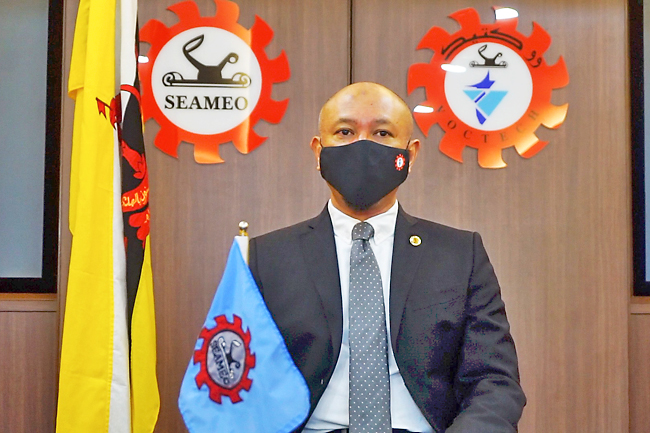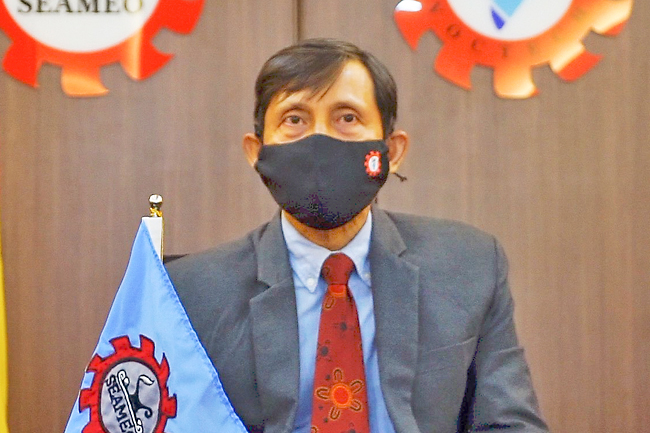Rokiah Mahmud
The establishment of the Southeast Asian Ministers of Education Organisation (SEAMEO) in 1963 aimed at promoting cooperation in the fields of education, science and culture. In addition, it serves as a regional inter-governmental organisation among governments in Southeast Asia.
Southeast Asia has 26 SEAMEO centres with their various undertakings concentrating on training as well as research in education, science and culture.
The SEAMEO Regional Centre for Vocational and Technical Education and Training (SEAMEO Voctech) was established in Brunei Darussalam on August 28, 1990 and stands tall among SEAMEO centres.
In an interview with the Bulletin, SEAMEO Voctech Deputy Director of Administration Pengiran Haji Mohd Sufri bin Pengiran Ali said in line with its establishment, SEAMEO Voctech has been mandated to assist other SEAMEO member countries in identifying and solving common problems in Technical and Vocational Education and Training (TVET).
According to the deputy director, SEAMEO Voctech is committed to achieving its mandate, guided by its vision to be a leading regional centre in advancing TVET for Southeast Asia and beyond.




At the same time, SEAMEO Voctech is also committed to meet its mission in assisting SEAMEO member states in advancing their TVET systems by providing relevant and effective programmes and services towards the sustainable development of the region.
In pursuing its role in promoting TVET, Pengiran Haji Mohd Sufri shared that SEAMEO Voctech was conceived and given the mandate of assisting and enhancing TVET systems of SEAMEO member countries through innovative services.
“Among the three major services offered at SEAMEO Voctech include training and professional development, research and consultancy services, and knowledge management and sharing,” he added.
In the fields of training and professional development, SEAMEO Voctech believes that delivering and promoting quality technical and vocational education as well as training is vital. Therefore, the centre provides four categories of training services by conducting regional, in-country, customised and special training programmes in the areas of curriculum development, management, teacher education, information and communications technology, research, and skills training. These programmes are often conducted in collaboration with SEAMEO Voctech’s or SEAMEO partners.
In the areas of research and development, SEAMEO Voctech prides itself on its expertise in research and research consultancy services with the core aim of elevating the quality of TVET in the region. The research programme is an important and built-in component in SEAMEO Voctech’s function as an international organisation.
For knowledge management and sharing, the centre also provides information services and disseminates information through print, digital and online pathways to reach the fast-increasing number of TVET clients in the region and beyond through its newsletter, social media, its website, e-library and SEA-VE.Net.
Apart from focussing on excelling in the field of research, consultancy as well as training, SEAMEO Voctech also plays its role in the community as part of their corporate social responsibility (CSR) initiatives, in particular when the country was hit by the second wave of the COVID-19 pandemic. The initiatives not only aim to ease the burden of those affected by the pandemic, but also students badly impacted and had to continue their studies via online learning.
For this purpose, aside from bringing their core business services online, for example in the conduct of SEAMEO Voctech’s training programme, SEAMEO Voctech has also actively taken part in a CSR initiatives showing their commitment and dedication as well solidarity responding to the national call to alleviate some of the challenges faced by the education sector due to pandemic.
One of the initiatives is to bridge the needy students in the country in terms of the digital divide and disparity by donating SIM cards and Internet top-up cards for continued Internet accessibility.
In another CSR initiative, SEAMEO Voctech provided staff with upcycled digital services such as desktop computers and laptops to help support the online learning of their children.
Meanwhile, in seeing the development of TVET amidst the demand of the fourth industrial revolution (IR4.0), SEAMEO Voctech Deputy Director for Professional Affairs Dr Paryono said in an effort to enhance the skills of workforce in the post-pandemic era and for SEAMEO Voctech’s aim to achieve its Five-Year Development Plan in ‘Preparing TVET for Industry 4.0’, the centre continues to strengthen its services to support the development of TVET in Brunei Darussalam and in the region.
This is especially in response to IR4.0 requirements through three main objectives: training and professional development; research and consultancies; as well as knowledge management and sharing.
“Under the training and professional development, SEAMEO Voctech offers capacity building to TVET trainers and academics in SEAMEO member countries and beyond as to identify and solve common problems in TVET through training and development initiatives on IR4.0 related topics.”
According to Dr Paryono, in collaboration with GIZ-RECOTVET, the centre has offered three topics of training programmes in the past two years. These include innovative teaching and learning for industrial changes due to IR 4.0; professional development training for TVET teachers in IR 4.0; and curriculum design for IR 4.0 work processes.
“In collaboration with the Institute of Technical Education Services (ITEES) Singapore and Temasek Foundation Singapore, we are running the third round of training programmes,” he said. “For this third round, we are offering four training programmes revolving around IR4.0 topics namely: online leadership training workshop for TVET leaders; skills upgrading course for TVET specialists in IR 4.0 on Robotics and smart systems; food processing andtechnology; and hotel management with IR 4.0,”
“Meanwhile, in the aspect of research and development, SEAMEO Voctech in collaboration with researchers from SEAMEO member countries representing ministries in charge for TVET and SEAMEO Centres conduct research on TVET Institutional Readiness for IR 4.0.
“In information and knowledge management and sharing, the centre brings together key TVET stakeholders to discuss pertinent TVET issues through various seminars, forums, conferences and meetings.”
He noted that a recent event was an E-Forum themed ‘Managing Pandemic Challenges and Opportunities of TVET in the Era of Digitalisation’.
“Most importantly, SEAMEO Voctech and its partner GIZ-RECOTVET gave developed a one stop-knowledge TVET platform (SEA-VET.net) which is gaining more and more traction in terms of usage and recognition from TVET providers, learners and researchers regionally and internationally. One of the features in these platforms is IR 4.0 and Digitalisation.
“In preparing TVET for IR 4.0 SEAMEO Voctech continues to engage with the global TVET community in understanding the changing economic and industry developments, to ensure that its practices reflect the new market demands and the centre’s services are in line with these requirements,” Dr Paryono added.
In strengthening the impact of the centre for young professionals, particularly those with vocational or technical careers with little awareness or knowledge about the establishment and functions of SEAMEO Voctech, Dr Paryono explained the centre continues socialising its programmes and services, especially in utilising the social media platforms.
Dr Paryono also shared that SEAMEO Voctech will continue working with TVET providers locally and in the region, for example in partnership with the Ministry of Education (MoE), to identify and provide industry-aligned training services, and offering training programmes that reach wider community by collaborating with the Lifelong Learning Centre (L3C), such as for industry players through Training of Trainers (TOT) and Training of Accessors (TOA) and offering both online and in-person training programmes and uploaded at SEA-VET.Net platform.
In sharing future plans and strategic initiatives of SEAMEO Voctech, Dr Paryono explained that SEAMEO Voctech’s future plans for the development of education in Southeast Asian countries include forward-looking innovations that could reshape the region in a post-COVID world and optimise the present of digitalisation and IR4.0.
“E-learning will be further enhanced as in augmented reality (AR) and virtual reality (VR) technology in education bring about an official computer-generated world with the potential to help enhance the learning experience,” said Dr Paryono.
“With this in mind, SEAMEO Voctech’s future plan is to offer theoretical and practical courses by integrating innovative strategies and technologies such as simulation, AR and VR into its learning platform. To that end, SEAMEO Voctech recently signed a memorandum of agreement (MoA) with its strategic partner, Labtech International Ltd and agreement with ADE Finland,” he added.





